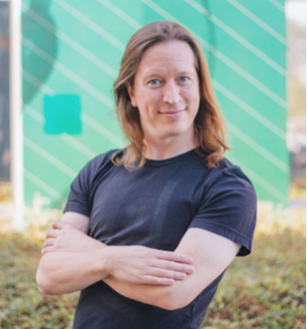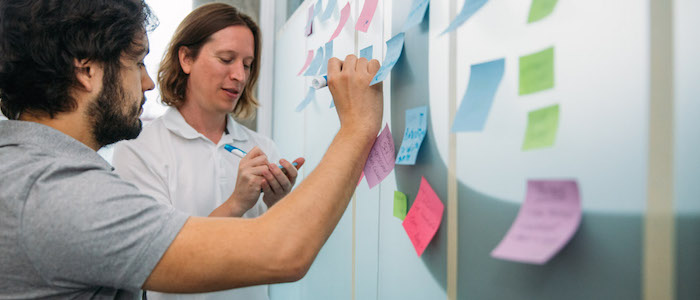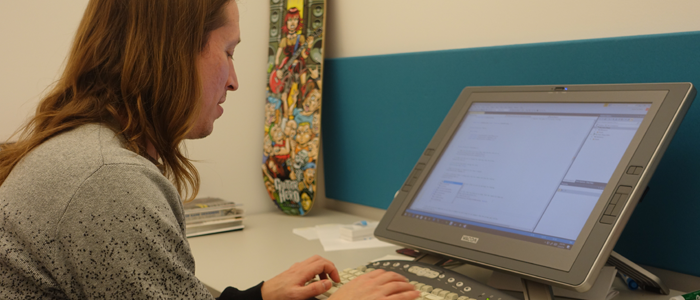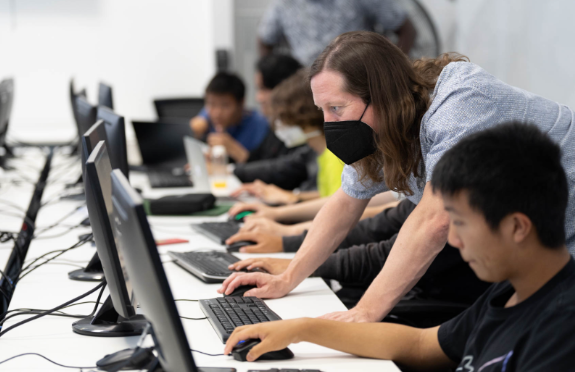
Master of Digital Media (MDM) alum, Jason Elliott, knew the MDM program was exactly what he was looking for when he considered going back to school as mature student. After completing the program in 2015, he decided to join the faculty.

"After having worked in games for years and teaching game related studies for a decade, I really wanted to try and put my skills to use in something other than entertainment. I knew that meant I was going to need to upgrade my own education mid-career. I wanted a professional masters and when I discovered the MDM, I applied. The MDM was the only digital media program of its kind that was focusing on interdisciplinary teamwork and solving problems for real world industry clients. It also had a venture pathway where I could potentially start my own company in a safe, supportive atmosphere. I jumped at this opportunity and I’m now a full-time faculty member who teaches game design, client-based project courses, as well as English for digital media in CDM’s Pre-MDM program.”
Jason as you reflect on the teaching excellence honour, did you ever anticipate that you would receive such an award?
"I am incredibly grateful for the recognition of my efforts, although I wasn’t even aware that I had been nominated! My focus has always been on providing the best educational opportunities I can for our students. I am always looking for ways to improve, to refine my course content, and make sure that everyone has the best possible experience."

As you look back on your career in industry and education, can you tell us how you have arrived at this moment to be distinguished as a teacher?
"Looking back upon my career, I feel that the most important factors that have contributed to my growth and educational excellence in the classroom are a passion for learning, holistic systems design, and working collaboratively.
I have always had a passion for learning, and I have experienced most methods of education. At first, I really appreciated technical schools, as they allow students to dive in and get their hands on the tools in a practical way. I have taken online courses for the last 20 years, which are great for allowing students to learn at their own pace. As I grew older, I found comfort in the academic classroom where students can explore subject matter in a much deeper way. The more I learn, the more I want to learn!
Holistic systems design is something rooted in game design and is very applicable to teaching. At its core, it is about understanding that the experience consists of a variety of smaller elements that work together as a whole, and that changing one thing is going to affect another. Working as a game designer, this was obvious, but it took me a while to understand how it applies in the classroom. During my first few years teaching, I was constantly updating and improving courses, but found that some of the problems I was encountering in the classroom were actually due to gaps in the overall curriculum. Being able to step back and see the whole student journey allowed me to identify ways to improve the overall experience and outcomes.
Finally, I believe my success really comes from working collaboratively with others. Developing games is not a solo effort and neither is the educational development process. The best example of this is here at the CDM, where faculty work closely together, even sitting in on each other’s classes, so we can provide insights, feedback, and adjust our own courses to fit the student needs. This not only makes for a better student experience, it also makes teaching so much more fun! "

Jason, at a certain point in your educational journey, you decided to expand your teaching focus beyond project supervision and game design to include teaching English for digital media. How did this change occur?
"I have spent my entire career working with many non-native English speakers, which was great for learning about different cultures, but was always challenging when it came to communication. At the CDM, which is primarily composed of international students, I had the opportunity to work closely with Dr. Aida Osian to help build PreMDM, a digital-media focused qualifying program that truly helps international students improve their English skills before entering the MDM program. At the beginning, my role was to teach team communication and production skills, while Aida took on the English learning. A couple of years ago, another faculty member, Patrick Pennefather, suggested taking my CELTA certification as a way to improve my teaching skills and strengthen my work with ESL students. Completing this certification reframed how I saw the educational journey of these students, and heightened my appreciation for some of the potential challenges they face. It was probably one of the best experiences I ever had and I apply the lessons learned in every class I teach!"
Jason, when you reflect on your journey, how has your experience at the CDM helped to nurture and inspire growth in both your professional and teaching practice?
'"I have a unique understanding of the MDM program because I am also a graduate, I was part of the C9 cohort! This gives me a lot of credibility with the students, we often talk about the importance of the learning experience and how the program is more than courses - it’s about collaboration, supporting each other, and building a space with psychological safety where we can explore and create together. This extends to the faculty team as well - we are very tight-knit and collaborative. Together we support the cohort as they journey through the program."
As a digital-media educator what is next for you?
"I will continue to improve the courses I teach, develop new ones, and contribute to maintaining our world-class program curriculum. Our faculty team is dedicated to maintaining a holistic outlook, continuously finessing our program. My individual contribution to this work is informed by my friendships and mentors in both the academic community and creative technology industry. I am fortunate to have supportive connections with incredible friends in my professional network, who also encourage me in many creative projects I build outside of my faculty role."

What advice do you have for other educators who may be starting out in their teaching careers?
"It is important to remember that every student is there for their own reasons, so make sure you establish context with them at the outset and help them to understand how what you are teaching them is applicable to their own goals. Explore cultural intelligence and integrate mindfulness in your daily interactions, this helps to make a supportive and calm setting for students to relate to you.
It’s valuable to conduct reflection reviews after every class to identify where things went well and where there is an opportunity for improvement. Don’t be afraid to make big changes, try different approaches to course delivery, types of assignments, and classroom dynamics. Communicate your intentions and ask for continuous feedback so that you can be responsive if something isn’t working!"